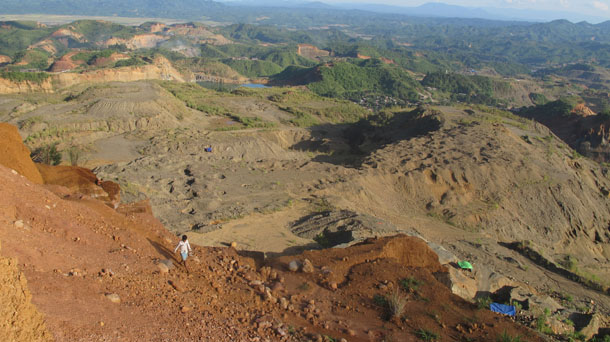RANGOON — Government troops have been deployed to protect a 20-ton raw jade stone that was found in Hpakant, a mining area west of the Kachin State capital that is known for possessing some of the world’s best jade.
Security has been tightened by soldiers and the police in Hpakant town, after the giant stone was discovered some 24 kilometers away in Wei Kan village on Feb. 9 by a small-scale miner, Aung Naing Win.
“As far as we know, the stone is 18 feet [5.5 meters] long,” said Shwe Thein, chairman of a branch of the National League for Democracy (NLD) in Hpakant. “Soon afterward, troops under the Light Infantry Division 101 were deployed.”
He said the army had since prevented small-scale miners and hand-pickers from searching for other stones nearby. “No one can access the area where the stone was found,” he said.
Some local jade miners said the stone was estimated to weigh as much as 37 tons, with half the stone remaining buried underground.
Yin Htwe, a resident in Hpakant town and a member of the local NLD branch, said small-scale miners claimed the raw stone was as big as a Mitsubishi Pajero truck.
“The stone is now fully guarded by the army. We don’t know for sure how much it will be worth,” he said. “We heard officials from the mining ministry will come see the stone.”
Burma produces the vast majority of the world’s jade, and the Burmese gemstone is of the highest quality. Most is sourced from Hpakant, 350 kilometers north of Mandalay, in the conflict-torn mountains of Kachin State.
The jade is often smuggled over the border to China through unregulated trade, without ever being taxed. A July 2013 report by the Ash Center for Democratic Governance and Innovation at Harvard University in the United States put the sale of Burmese jade at as high as US$8 billion in 2011.
The government and the Kachin Independence Army (KIA), a rebel group, controlled the jade mining industry in Hpakant between a ceasefire deal in 1994 and 2011, when fighting between both sides resumed. That year the government suspended large-scale mining operations in the area. Small-scale miners and hand-pickers moved in illegally to try their luck.
Most jade mining companies that operated in Hpakant were run by Chinese businessmen and Burmese cronies. One of the biggest players in the industry was the Union of Myanmar Economic Holdings Ltd (UMEHL), a Burmese military-run conglomerate that dominates many sectors of the country’s economy.
An official at the Ministry of Mining said he was not familiar with the case of the 20-ton jade stone in Kachin State and recommended contacting the ministry’s gems department. The gems department could not immediately be reached for comment on Tuesday.

















